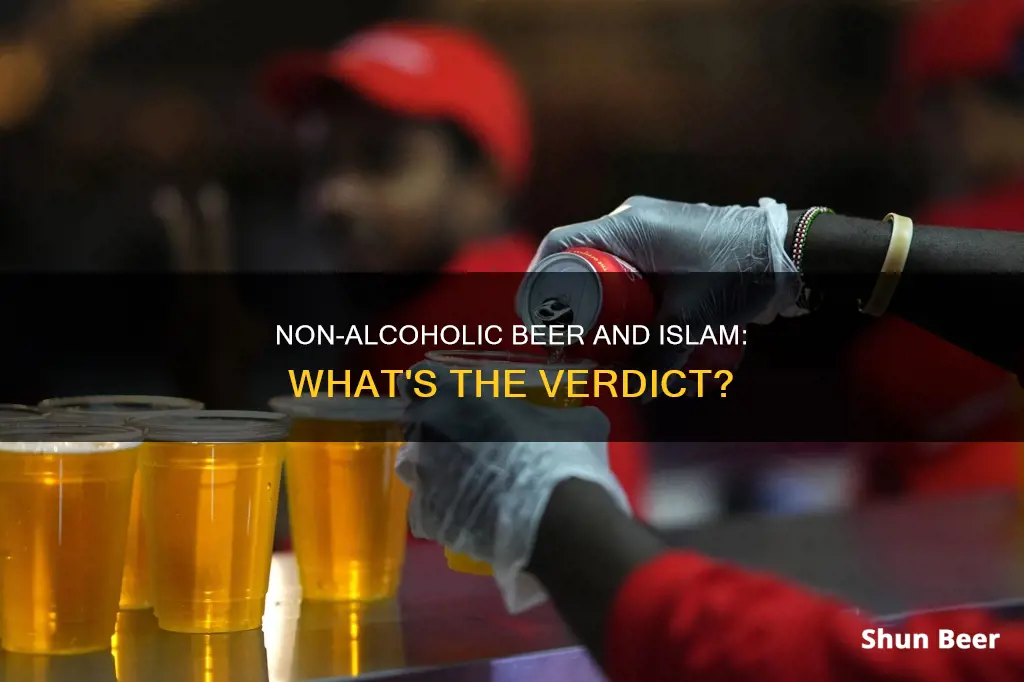
Alcoholic drinks are considered haram in Islam, and Muslims are not allowed to drink them. But what about non-alcoholic beer? Can Muslims consume it without going against their religious beliefs? This is a complex topic with different viewpoints. Some scholars argue that non-alcoholic beer is still made using the same process as regular beer, and even after extracting the alcohol, a small percentage remains. Therefore, it is haram. However, other scholars differentiate between intoxicating and non-intoxicating beer, considering the latter permissible if it is completely alcohol-free or contains a minuscule amount that does not cause intoxication.
| Characteristics | Values |
|---|---|
| Drinking non-alcoholic beer in Islam | Non-alcoholic beer is generally considered haram because it is drunk as an alternative to alcoholic beer, which is forbidden. However, some scholars argue that non-alcoholic beer is permissible if it is completely free of alcohol or contains a minuscule amount of alcohol that does not cause intoxication. |
| Alcohol content in non-alcoholic beer | Non-alcoholic beer typically contains a small percentage of alcohol (less than 0.5% ABV), as it is very expensive for companies to remove 100% of the alcohol. |
| Halal certification for non-alcoholic beer | For a non-alcoholic drink to be considered Halal, it should have an ABV of less than 0.05% and be labelled as 0.0% ABV. |
What You'll Learn
- Non-alcoholic beer is haram as it is derived from a haram product
- The Islamic principle of blocking the doors to transgression
- Non-alcoholic beer is halal if it contains 0.0% ABV
- Non-alcoholic beer is haram if it is drunk in the same way as an alcoholic beer
- The Prophet's words: Whatever intoxicates in large quantities, a little of it is haram

Non-alcoholic beer is haram as it is derived from a haram product
The consumption of alcohol is prohibited in Islam as it is considered to be a form of ""intoxicant" or "defilement from the work of Satan". The Prophet (peace and blessings of Allah be upon him) said: "Every intoxicant is khamr and every intoxicant is haram." This means that even a single drop of intoxicating liquor is forbidden.
Non-alcoholic beer is made using the same process as regular beer, and alcohol is only extracted after the beer is produced. As a result, non-alcoholic beer always contains a minuscule amount of alcohol, usually ranging from 0.05% to 0.5% ABV.
According to the Islamic principle, "if the whole of a thing is haram, then a part of it is also haram". Based on this principle, the Islamic Religious Council of Singapore has stated that non-alcoholic beer is haram. This is because it is derived from a haram product (alcoholic beer) and is drunk as an alternative to it. Additionally, the culture of beer drinking is considered non-Islamic and, therefore, haram.
However, it is worth noting that the amount of alcohol present in non-alcoholic beer is negligible and does not have any intoxicating effects. Some scholars argue that non-alcoholic beer is permissible because it does not cause intoxication. Shaykh Ibn ‘Uthaymin stated that the beer sold in Saudi Arabia is halal because it has been inspected and is completely free of alcohol. He added that any food or drink is permissible unless proven to be haram.
Furthermore, many everyday foods, such as bread, soy sauce, fruit juices, and jams, contain small amounts of alcohol as a result of preservation methods, yet they are considered halal. Similarly, non-alcoholic beers that are brewed with other halal ingredients such as hops and grain can also be halal certified by organisations such as Halal Australia and the Islamic Food and Nutrition Council of America.
In conclusion, while the Islamic Religious Council of Singapore and some scholars consider non-alcoholic beer haram due to its derivation from a haram product, other scholars and organisations argue that it is permissible because it does not cause intoxication and is made with halal ingredients. The permissibility of non-alcoholic beer in Islam remains a subject of debate, and individuals should consult religious authorities or experts for definitive answers.
Beer and Excedrin: Safe Mix or Not?
You may want to see also

The Islamic principle of blocking the doors to transgression
The Islamic principle of "blocking the doors to transgression" is a concept in Islamic jurisprudence that aims to prevent Muslims from engaging in any form of haram, or forbidden, actions. This principle is derived from the Quranic teachings and the Prophet Muhammad's (peace and blessings be upon him) sayings, which guide Muslims to avoid not only major sins but also minor ones that could potentially lead to larger transgressions.
In the context of drinking non-alcoholic beer, the Islamic Religious Council of Singapore has applied this principle to deem non-alcoholic beer as haram. Their reasoning is based on the understanding that the process of making non-alcoholic and alcoholic beers is the same, and that alcohol is only extracted from the final product to make it "non-alcoholic." They argue that since it is haram to drink alcoholic beer, and the process of making both types of beer is identical, then non-alcoholic beer is also haram. This is in line with the Islamic principle that if the whole of a thing is haram, then a part of it is also haram.
Additionally, the culture of wine and beer drinking is seen as non-Islamic and therefore haram. The Islamic principle of blocking the doors to transgression considers not only the substance itself but also the intention and cultural context surrounding its consumption. By drinking non-alcoholic beer, one may be seen as partaking in a non-Islamic culture, which is prohibited.
It is worth noting that there are differing scholarly opinions on this matter. Some scholars argue that non-alcoholic beer is permissible if it is completely free of alcohol or contains only a minuscule amount that does not cause intoxication. They base this ruling on the understanding that the Prophet Muhammad (peace and blessings be upon him) prohibited only intoxicating substances. As long as the drink does not intoxicate, it is not considered haram.
The principle of blocking the doors to transgression is not just limited to the consumption of non-alcoholic beer but can be applied to various aspects of Muslim life. For example, in the case of transgressions against the rights of others, repentance and seeking forgiveness are essential. Additionally, the restoration of rights and compensation are crucial, as righteous deeds alone may not be sufficient to expiate for these sins.
Beer and Theraflu: A Safe Mix?
You may want to see also

Non-alcoholic beer is halal if it contains 0.0% ABV
Drinking non-alcoholic beer is a topic of debate in Islam. While some scholars argue that it is permissible, others claim that it is haram. The key factor in determining the permissibility of non-alcoholic beer is the presence and quantity of alcohol it contains.
Non-alcoholic beer with 0.0% ABV is generally considered halal in Islam. This means that the beverage contains no alcohol and, therefore, does not fall under the category of intoxicants, which are prohibited in Islamic teachings. The Prophet (peace and blessings of Allah be upon him) said, "Whatever intoxicates in large quantities, a little of it is haram." This implies that if a substance does not intoxicate at all, even in large quantities, it is permissible.
Some scholars, like Shaykh Ibn 'Uthaymin, support this view by stating that non-alcoholic beer sold in marketplaces is halal because it has been inspected and found to be completely free of alcohol. The principle here is that all food and drink are considered permissible unless proven otherwise.
Additionally, the process of dealcoholization, where alcohol is removed from regular beer to make it non-alcoholic, is not a factor in the Islamic ruling. Even if alcohol is initially present and then removed, as long as the final product contains 0.0% ABV, it is generally accepted as halal.
However, it is important to note that some Muslims may still choose to avoid non-alcoholic beer due to its association with the culture of wine and beer drinking, which is considered non-Islamic. The Islamic Religious Council of Singapore, for example, states that "the culture of wine and beer drinking which the drink entails is non-Islamic and, therefore, haram."
In conclusion, non-alcoholic beer with 0.0% ABV is generally accepted as halal in Islam, as long as it does not lead to the consumption of intoxicating beverages and is not associated with non-Islamic cultural practices.
Beer and Periods: A Healthy Mix?
You may want to see also

Non-alcoholic beer is haram if it is drunk in the same way as an alcoholic beer
The consumption of alcohol is prohibited in Islam, as it is considered a form of "intoxicant" or "defilement from the work of Satan". The Islamic principle states that if a whole thing is haram, then a part of it is also haram. This means that even a single drop of alcoholic beer is haram.
Non-alcoholic beer is made using the same process as regular beer, but the alcohol is then extracted. However, it is important to note that non-alcoholic beers are not 100% alcohol-free. The Islamic Religious Council of Singapore states that non-alcoholic beers are haram because they are drunk as an alternative to alcoholic beer, and the culture of beer drinking is non-Islamic and therefore haram.
The permissibility of a substance in Islamic law is determined not only by its effects but also by the intent behind its consumption. If a non-alcoholic beer is drunk in the same way as an alcoholic beer, with the intention of intoxication, it can be considered haram. However, if the beer is consumed for its health benefits, such as reducing the risk of heart disease or aiding in weight management, it may be considered permissible.
It is worth noting that the understanding and interpretation of what constitutes halal can vary among scholars and jurists, and different people may have differing opinions. It is always best to consult a religious authority or expert for specific guidance.
Stroke Patients and Beer: What's Safe to Drink?
You may want to see also

The Prophet's words: Whatever intoxicates in large quantities, a little of it is haram
The consumption of alcohol in Islam is a complex issue that has been the subject of much debate and interpretation. The Prophet's words, "Whatever intoxicates in large quantities, a little of it is haram," serve as a guiding principle for Muslims in navigating this complex topic. This hadith underscores the Islamic prohibition against intoxicating substances and provides a framework for understanding the permissibility of certain substances.
The hadith states, "Whatever intoxicates in large quantities, a little of it is haram," indicating that even a small amount of a substance that causes intoxication is prohibited. This principle is based on the understanding that intoxication can lead to impaired judgment and a loss of control, which are considered harmful in Islam. The Prophet's words encourage Muslims to be cautious and avoid any substance that has the potential to cause intoxication, regardless of the amount consumed.
The interpretation of this hadith has been a subject of discussion among Islamic scholars, particularly in relation to non-alcoholic beverages. Some scholars argue that non-alcoholic beer, which typically contains a minuscule amount of alcohol, falls under the prohibition outlined in the hadith. They assert that the process of making non-alcoholic and alcoholic beers is the same, and therefore, consuming non-alcoholic beer goes against the Islamic principle of "blocking the doors to transgression."
However, other scholars differentiate between intoxicating and non-intoxicating beers. They argue that non-intoxicating beer, which contains a negligible amount of alcohol that does not lead to intoxication, is permissible. This view is supported by the understanding that the basic principle concerning food and drink is that they are permissible unless proven otherwise. As long as the amount of alcohol is minuscule and does not cause intoxication, it is considered halal.
It is worth noting that the hadith "Whatever intoxicates in large quantities, a little of it is haram" is not limited to alcoholic beverages but applies to any substance that can cause intoxication. This includes solid and gaseous substances, such as hashish or cannabis, which were unknown during the Prophet's time but have since been recognized by scholars as intoxicants and are therefore prohibited.
Beer and Metformin HCL 500 mg: Safe Mix?
You may want to see also
Frequently asked questions
There is debate on this topic. Some scholars argue that non-alcoholic beer is haram because the process of making alcoholic and non-alcoholic beers is the same, and the culture of beer drinking is non-Islamic. Others argue that non-alcoholic beer is halal if it contains 0.0% ABV.
The Islamic Religious Council of Singapore has stated that non-alcoholic beer is haram because the process of making alcoholic and non-alcoholic beers is the same, and the culture of beer drinking is non-Islamic. However, other scholars argue that non-alcoholic beer is permissible if it is completely free of alcohol or contains a minuscule amount that does not cause intoxication.
There is disagreement on this issue. Some scholars argue that even non-alcoholic beer with 0.0% ABV is haram because it is made in the same way as alcoholic beer and is drunk as an alternative to it. Others argue that it is halal as long as it contains no detectable alcohol.







